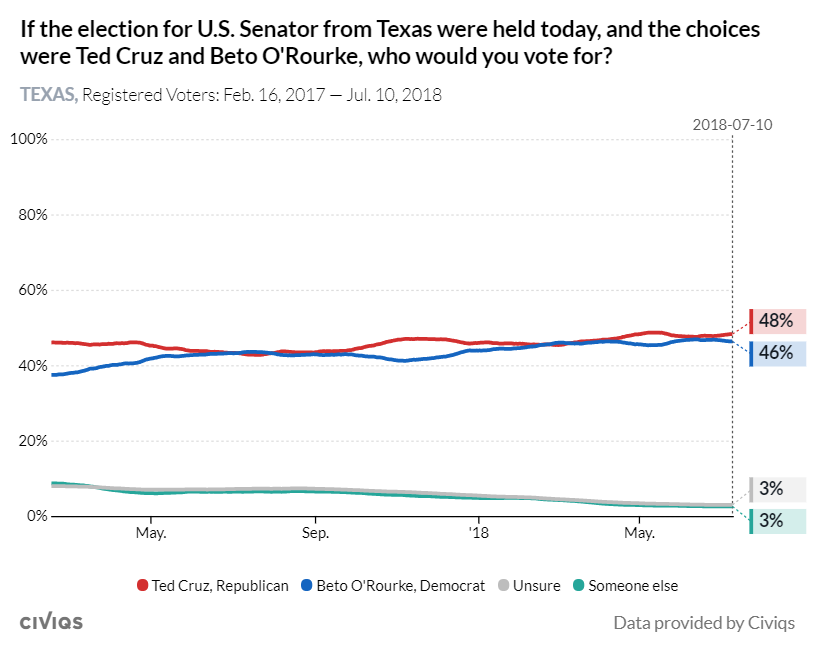Last week, Markos at Daily Kos posted this:
I didn’t want to believe Politico’s, “Beto-mania sweeps Texas.” But a look at our Civiqs Texas data (which we poll for our own use, not for any client), and holy shit, it’s real!
Yup. That’s the odious and treason-enabling Ted Cruz leading by just TWO POINTS.
For context, our numbers in the Texas governor’s race look more as you’d expect, with Republican incumbent Gov. Greg Abbott leading Democratic challenger Lupe Valdez 51-41. So where is Cruz struggling?
There’s the typical 2018-style gender gap, with Cruz leading among men 54-41, and losing women 43-51. Cruz is winning white people 59-36, while losing Latinos 70-24, and black voters 79-14. O’Rourke is winning 18-34 voters 55-37, while losing the 65+ set 58-38. The future looks bright, but we can’t afford to wait for the future! A lot will be riding on O’Rourke’s ability to get out the young vote. Do-or-die, pretty much.
In the end, with both candidates solidifying the support of their base, everything will turn on O’Rourke’s ability to squeeze out the most votes from self-styled independents.
There’s another graph showing Beto leading Cruz 49-44 among indies, but that’s not the point I’m working on here. The point is that Civiqs has Cruz up only two on O’Rourke, which is the closest the race has been shown to be, and it’s got Republicans – perhaps sincerely, perhaps performatively – freaked out, as a recent fundraising email shows.
You’d think a poll like this would set the world on fire, but other than the GOP email there hasn’t been much out there. This is probably because Civiqs uses some non-standard methodology. Here’s Gardner Selby doing an explainer/fact check thing on it:
To our inquiry, the director of Civiqs, Drew Linzer, told us the poll showing O’Rourke just behind Cruz, available to Civiqs subscribers, was accurately portrayed by Moulitsas.
By email, Linzer further said the poll, not commissioned or sponsored by a client, relied on responses since February 2017 from respondents engaged over the web as volunteers for Civiqs survey panels who self-identified as Texas residents and registered voters.
Civiqs says in the methodology section of its website that it maintains a growing list of Americans who have agreed to take polls at civiqs.com. Panelists reside in all 50 states and Washington, D.C., and match the contours of the United States along key geographic, demographic and ideological lines,” Civiqs says.
We asked Linzer, a former political scientist at Emory University, to talk about relying on responses collected over more than 17 months. “The lengthy timeframe,’Linzer replied, “enables Civiqs to perform long-term daily tracking in a sustainable, methodologically rigorous manner.” Civiqs, he said, applies “specialized trendline fitting statistical models” to ensure the results match current public opinion.
Linzer said by phone that for the Texas poll, Civiqs emailed 40 to 50 respondents a day, asking each one about their Texas residence and registered voter status and stance on the Senate candidates, with those results over time feeding the trend line.
As of July 4, the latest date shown on the trend line posted by Moulitsas, “the most recent day’s worth of data has the greatest impact on the result,” Linzer said, though responses from previous days mattered a lot, too, he said. Linzer said responses gathered in 2017 also contributed to the result, but only “infinitesimally so.”
“It’s complicated. It is a little different from what a traditional pollster does” in reaching one set of respondents over a few consecutive days, Linzer said.
Make of that what you will, basically. FiveThirtyEight doesn’t include Civiqs in its pollster rankings, perhaps (I’m hypothesizing) because Civiqs’ methodology is such that they don’t meet the 538 definition of a “pollster”. Whatever the case, I’m glad Selby wrote about this because I had no idea what to make of this. I still don’t, but at least I feel like I understand the dimensions of the question better. Also, I’m going to get a second post out of this, which is always a good thing from my perspective. You’ll have to wait till tomorrow on that one.


Predicting who will win is like reading tea leaves.
Primary numbers from 2014 and 2018 suggest that the Democrats have a chance of winning a few seats state wide.
Pingback: Republicans and Independents – Off the Kuff